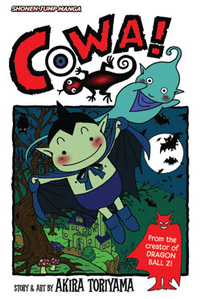Review
by Carl Kimlinger,Cowa!
GN 1
| Synopsis: |  |
||
Life is good, if surprisingly ordinary, for vampire/were-koala half-breed Paifu. His nights (monsters don't like daylight) are filled with mischief-making, errands, grade-school rivalries, and plenty of plain goofing off. Of course, all children have their fears—even the monsters. Fear of angels, heaven, and their parents. But far and away the most frightening thing in Batwing Ridge is Mako “The Volcano” Maruyama (AKA Makoleen), the massive human outcast who haunts the outskirts of their town. When a Monster Flu epidemic incapacitates the adult monster population, Paifu and his friends—Jose the ghost and Arpon the monster-ish, possibly aquatic thing—are commissioned to purchase the vaccine from a far-away witch. In dire need of assistance, they turn for help to the biggest, scariest thing in the village: Makoleen. One phony ten-thousand-dollar reward later and their journey begins, through rednecks, car wrecks, gangsters and ghouls. |
|||
| Review: | |||
I had a literature professor who once said that authorial intent is as useful in understanding literature as reading pig entrails is in understanding the future. As a totally shallow demonstration of why this is a truism, take Cowa!: Akira Toriyama writes that he wanted to make a straightforward storybook starring a “totally unlovable grumpy guy.” And yet his action instincts continually get the better of him—staging some decidedly un-storybook fights—and Makoleen is one of the most likeable grumpy guys ever. Not that either is a problem. Quite the contrary. Makoleen's character elevates what might have been a simple children's adventure to a gentle fable about acceptance and understanding, and since when was whaling on punks anything but an advantage? Toriyama's offbeat humor, even dampened by the restrictions of children's stories (no running poop jokes or recurrent panty humor here), is a natural draw. The monsters' reversals of normal human behavior—in particular a scary game of “angel tag”—are always good for a chuckle, and chapters are as likely to end on a silly gag as they are on a cliffhanger. And for a while, that's the only draw the book has. The plot is simplicity itself—a straightforward road trip—and at times approaches haphazardness in its habit of tossing random obstacles into its protagonists' path. But then the bond between Makoleen and his monstrous little charges begins to develop and a curious thing happens: the story grows a heart. Initially Makoleen seems a strange choice for lead character. A confessed killer and unapologetic loner, he's fat, mean, and ill-tempered. It becomes obvious early on that he makes an incongruously cool action hero—he's got serious moves for a fat guy—but it's his slow transformation from quick-tempered mercenary to canny, concerned partner that becomes the sympathetic core of his character. It's a simple progression, fuelled by convenient, repetitive plot complications, and the moral message implicit in Paifu's shifting regard for Makoleen is well-worn (it is aimed at kids after all), but Toriyama has the good sense to refrain from vocalizing his morals and to retain Makoleen's surly, iconoclastic edge, even as he waxes nice. Toriyama's art is simple to a fault. The monster children, though cute, are bare-bones caricatures. His settings have little of Dr. Slump or Dragon Ball's insane inventiveness. He favors Simple Line drawings over complex textures and intensive detail. Makoleen is probably the pinnacle of the book's artistic achievement, his design as simple as any in the book—all slouching posture and round, chubby lines—and yet still capable of communicating emotions ranging from bitter disappointment to desperately disguised joy with nothing more than pair of bruised, shifty eyes and a slit of a mouth. In keeping with Toriyama's storybook intent, Cowa!'s panels are rectangles arranged in simple, intuitive patterns, a layout that, when added to the art, can make the book a visual bore. Toriyama uses the simple panel arrangements for humorous repetition and time-spanning montages, but the book doesn't escape the visual doldrums until he loosens up and falls back on manga's traditional cinematic qualities, throwing together straightforward but memorable action sequences. While Viz's decision to publish a children's story in its original unflipped tankoubon format is questionable, it does make for a fine introduction for youngsters to the world of manga. Viz kept the first chapter in color, a decision that would have been better had they also kept the second chapter in color—the decolorization makes it murky and hard to follow—but is nevertheless welcome. All of the sound effects are replaced and the extras are nil, as is Viz's wont. The plot development is too purely random and the artistic approach too simplistic for Cowa! to be anything more than children's fare, but it's children's fare with a sweet center that never grows saccharine. And glowering beefy guys everywhere will be glad to see someone willing to acknowledge that there may be a little cuddly kindness under all that grizzled bluster. Go Volcano! |
| Grade: | |||
|
Overall : B-
Story : B
Art : C+
+ Uncomplicated one-shot adventure for kids that doesn't abuse the brain or neglect the heart; unusual but excellent choice in lead characters. |
|||
| discuss this in the forum (4 posts) | | |||
| Production Info: | ||
|
Full encyclopedia details about Release information about |
||